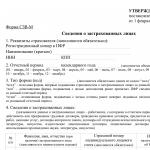Plusquamperfekt and nachdem
Gromov E.V., teacher of German
MBOU "Bolsheignatovskaya secondary school"

Plusquamperfekt and nachdem
- Let's take two simple sentences:
- Ich habe die Arbeit been det. - I've finished my work.
- Ich bin nach Hause gegangen. – I went home.

Plusquamperfekt and nachdem
- In both proposals Perfect (perfect tense). All this has already happened, in the past. But the first event (finishing work) happened before the second (going home). Therefore, for the first event, you can use twice the past tense, prepast tense - Plusquamperfekt(which means in Latin more than perfect):
 ich hatte, ich bin - ich war. "width="640"
ich hatte, ich bin - ich war. "width="640" Plusquamperfekt and nachdem
- Ich hatte die Arbeit beendet. Ich bin nach Hause gegangen.
- To do this, as you can see, you just need to put an auxiliary verb in Präteritum (past tense) : ich habe - ich hatte, ich bin - ich war.

Plusquamperfekt and nachdem
- Most often Plusquamperfekt used in complex sentences with an introductory word nachdem (after) :
- Nachdem ich die Arbeit been det hatte, ging ich nach Hause.
- = Nach der Arbeit ging ich nach Hause.

- Note that the main clause uses Prateritum(but not Perfect). This is the only case of tense agreement in German: in sentences with nachdem(and it's not mandatory at all). If one time is a composite ( Plusquamperfekt because it consists of two verbs: semantic and auxiliary), then the second is simple, consisting of one verb ( Prateritum). Like this:
Plusquamperfekt and nachdem

Plusquamperfekt and nachdem
- Nachdem ich nach Hause gekommen war, aß ich zu Abend. - After I came home(in Russian, you can say easier: coming home) , I had dinner.
- Nachdem ich gegessen hatte, schaute ich noch ein wenig fern. After I had eaten, I watched some more TV.

Plusquamperfekt and nachdem
- Nachdem mein Wagen gestohlen worden war, rief ich die Polizei. - After my car was stolen, I called the police.
- In the latter case, you see Plusquamperfekt passive. It remains to add that, in addition to proposals with nachdem(and then only if they are talking about the past) the past tense is rarely used, and in colloquial speech it is almost not used at all.

Make sentences with nachdem in the past time
- einen Freund treffen - zusammen ins Cafe gehen (meet a friend - go to a cafe together), im Cafe essen - ein schönes Mädchen sehen - es / sie kennen lernen (wollen) (eat in a cafe - see a beautiful girl - meet her (want) , es / sie ansprechen - (sie) lächeln (talk to her - smile), (wir) sich sicherer fühlen - (wir) sich vorstellen - an ihrem Tisch bleiben (-blieb - geblieben, s) - viel sprechen (-sprach - gesprochen) und trinken (-trank - getrunken)

Make sentences with nachdem in the past time
- – zusammen singen (-sang - gesungen) - ganz glücklich werden (-wurde - geworden, s) - sich streiten (-stritt - gestritten) - sich schlagen (-schlug - geschlagen) - von der Polizei festgenommen werden - ganz traurig werden (feel more confident - introduce yourself - stay at her table - talk and drink a lot - sing together - become completely happy - quarrel (argue) - fight - be detained by the police - become completely sad).
Subject: REISEN SIND SCHOEN
Lesson Objectives:
- Cognitive: to acquaint with the map of Germany and its cities.
- Developing: develop industriousness, dedication, memory (auditory, visual), speech, communication skills.
- Training: develop perceptual and receptive reading skills. To form the skills of speaking, dialogic speech.
- Educational: cultivate curiosity.
Equipment: Germany map, travel plans, illustrations.
During the classes
I. Beginning of the lesson. Organizational moment.
a) greeting in German: Guten Morgen!
b) the message of the topic of the lesson, the objectives of the lesson.
theme: REISEN IST SCHÖN. Today we will learn to read and act out a dialogue, get acquainted with the cities of Germany and find out how our friends from Germany travel.
II. phonetic charging.
a) students repeat the letters of the alphabet;
b) counting to 10 in German: eins, zwei, drei, vier, fünf, sechs, sieben, acht, neun, zehn, je, ja, jo, ju, u-o-a, u-u, o-o.
III. Voice charging.
Let's repeat the advice of our German friends. What do you need to do to know German well? We read according to the table (first the teacher), students read in chorus or individually.
1. LerntDeutschjedenTag! Learn German every day!
2.Hort aufmerksam! Listen carefully!
3. Lernt richtig lesen! Learn to read correctly!
4. LestDeutsch! Read in German!
5. Lest viel! Read a lot!
6 Spielt Gesprache! Act out the dialogue!
7. Schreibtrichtig! Write correctly!
8. Schreibt schon! Write beautifully!
9. Lernt gut! Learn well!
(When reading, pay attention to reading letter combinations, diphthongs, letters with umlauts).
IV. Formation of reading skills. Work with travel plans.
St. 2, S. 44. Microtext for reading exercises.
a) I am reading a microtext (sample reading). |
When reading, pay attention to the letter combinations highlighted by the arc. |
Students read the same text in unison. |
|
The text is translated by students according to the textbook, inserting the words (previously encountered) missing in the translation: Freund, Deutschland. |
(guessing the meaning of the word) |
Die Freunde reisen durch ganz Deutschland, um viel zu sehen. Jeder hat seinen Reiseplan. |
Friends travel all over Germany, to see a lot. Everyone has their own travel plan. |
b) Working with Hans Koenig's plan: |
Reading installation (what to do) |
I propose to consider Hans Koenig's travel plan. |
|
Sieh dir den Reiseplan von Hans Konig an! |
Answer: Where is he going? |
Hans König wohnt in Meissen. |
To make a sentence. |
Wohin fahrter? |
The sample below will help answer. |
Before answering the question, we read the names of the cities in unison: Meissen, Siegen, Leverkusen, Münster, Bochum, Manover. |
Preparing for the assignment. |
I remind you to use prepositions: von(from; from where) the journey began; uber(through) what cities does the path pass nach(shows final destination). |
|
We make a proposal by answering the following questions: |
|
Er fährt von Meissen, über Siegen, über Leverkusen,über Münster, über Bochum nach Manover. |
|
c) Working with Rolf Kluge's travel plan: |
At this stage, I use visibility. |
The students read the textbook. |
|
Rolf Klüge wohnt in Leipzig. Das ist der Reiseplan von Rolf. Wohin fahrter? |
Rolf Kluge lives in Leipzig. This is the plan Rolf's travels. Where he's on his way? |
Before completing this task, we practice the pronunciation of German cities in unison: Leipzig, Jena, Sonneberg, Würzburg, Frankfurt am Main, Koblenz, Bonn. |
|
We make a proposal: |
|
Er fährt von Leipzig, über Jena, über Sonneberg, über Würzburg, über Frankfurt am Main, über Koblenz nach Bonn. |
|
V. Formation of reading skills. |
|
a) Microtext. We read, paying attention to the letter combinations highlighted at the bottom with an arc: |
Translation of the text on the right: insert missing words. |
Die Deutschen reisen sehr gern. Das ist ihr hobby. Wohin mochten die Freunde fahren? |
Germans travel very willingly. This their hobby. Where would you like friends to go? |
b) In chorus we read the names of the countries where our friends would like to go. (Sabine and Werner; Barbara and Gerda). |
|
c) Make up a sentence by answering the question. |
|
Where would you like to go friends? |
|
Werner möchte nach Finnland fahren. |
|
Sabine möchte in die Schweiz fahren. |
|
Barbara mochte nach Russland fahren. |
|
Gerda möchte in die Türkei fahren. |
|
r) Wohin mochtest du fahren? Schreibe! |
Where would you like to go? |
Ich mochte... |
They must complete the sentence and write it down (from the first presentation). |
VI. Formation of the skill of dialogic speech |
|
Learning to make dialogues: |
Development of communicative qualities. |
Wir spielen Gesprache! |
|
I suggest we talk. |
There is a chart on the board to help. |
Friends met: remember to look at each other when talking to each other (as Frau Höflich teaches). |
|
visual support. |
|
Greeting: How are you? |
|
Words of courtesy. |
|
Alexei: Guten Tag Raja! |
I help by offering speech samples in Russian or offering to quickly find what you need in a book. |
Raya: Hallo, Aljoscha! |
|
Alexei: Wie geht's? |
|
Raya: Danke, gut! Und wie geht es dir? |
|
Alexei: Danke, prima! |
|
Raya: Reist du gern? |
|
Alexei: Ja, ich reise gern! |
|
Raya: Und du, reist du gern? |
|
Alexei: Ja, ich reise gern.Wohin mö chtest du fahren? |
|
Raya: Ich mochte nach Finnland fahren. and du, wohin mö chtest du fahren? |
|
Alexei: Ich mochte in Deutschland fahren. Auf Wiedersehen! Alles Gute! |
I do not forget to praise: gut, sehr gut, richtig. |
VII. Lesson conclusions. |
|
So, we tried to make a dialogue with you. We will do this all the time in order to learn to speak German. |
Evaluation of students' activities. |
Children sum up. |
|
Teacher: What did we learn to do in the lesson? |
|
Teacher: What else? |
|
Alexei: Learned to speak German learned the cities of Germany. |
|
Teacher: What did you like the most? |
|
Children evaluate each other's answers. I put marks: Paradise - 5, Alexey - 4. |
|
Raja - eine Fünf, sehr gut. Alex - eine Vier, gut. |
|
Homework: Section 46, Aufgabe 1. |
|
- Wohin mö chtest du fahren? |
|
- Ich reise gern. |
|
Ich möchte nach/in ...fahren. |
|
(In the yellow box, write sentences and learn these speech patterns). |
Learning German with a native speaker: pros and cons. How to choose a teacher, what are the pitfalls, and three important conclusions!
Some 12 years ago, when I was graduating from university in Irkutsk, in order to write an essay, I had to sit for hours in the reading room. To listen to the German speech, one had to go to a language laboratory (I wonder if there are any left now?), and it was almost impossible to find a German in our city to practice spoken German... native language was not with anyone.
And now? If you want in German - please!
If you want to practice pronunciation - it's easy!
Phonetic simulators, online, and if you don’t understand something, go to, they will explain everything there.
And even learning a language with a German is not a problem! On Skype, even from Vladivostok, even from Kaliningrad - whatever you like.
So, when I think about a foreign language with a native speaker, I immediately remember 3 stories.

Story one
This incident happened to my sister. She asked not to be named, so we will give her a code name - "Laughing".So, Laughter was very fond of Latin American music and, having heard a lot of sweet-voiced Spanish-speaking guys, set out to learn Spanish. Because we always want to understand what is being sung in our favorite songs. One of my girlfriends, for example, having heard the Beatles at the age of 13, fell in love with them so much that she prescribed Eshko, and this determined her entire future fate. Well, that's a great topic for another article. Let's go back to Laughing.
She is a lively girl. Therefore, it was decided to learn Spanish immediately with a native speaker. She did not look for a teacher for a long time. Since she was a frequenter of Latin parties, of which there were always plenty in Moscow, there were a lot of "Spaniards" in her environment.
Laughter is a responsible girl. She prepared very carefully for the first lesson. I bought 2 notebooks - one for classes, one for a dictionary, colored pens to highlight important theses, even got a textbook. In general, it was in full combat readiness. Unlike the teacher, as it turned out. When he saw the textbook and the whole arsenal of stationery with which she was armed, he was puzzled. And then he was stunned by her craving for knowledge. Laughter spoke vague words like "conjugation" and generally showed activity for which he was not ready. She (surprisingly!) kept asking him some incomprehensible questions, each of which began: “Why ...?”. He answered every question: “Well, they say so.” This was not the answer she was expecting. Needless to say, there were no more lessons ....
Conclusion one: If you want to study with a native speaker, find out if he is a teacher?
We are all native speakers of some language. But that doesn't mean we know him. Knowing a language and speaking it are two different things. I speak Russian, but I have already forgotten about conjugations, cases and other "charms" of the great and mighty. Therefore, I can hardly explain something clearly without preparation. In addition, it is not enough to explain the topic correctly for it to be assimilated. You need exercises, you need to be able to correctly build a lesson so that the grammatical material is correctly “implemented” into speech. So, if you want to study with a native, make sure that he knows how to teach and knows the subject.

Story two
When I decided to record audio trainings in English, I could not even think that I might encounter some difficulties in finding a native speaker. Already in Moscow, I thought, I would certainly find someone who would be interested in earning some money as an announcer. I didn't count on an Englishman, but I can easily find an American, for some reason I thought. Started looking. Interrogated friends. Didn't find anyone. Posted an ad. Nobody responded. Made a post on social media. networks. Same result. I even wrote to a few expats directly. Nothing.Let's do it differently, I thought. We enter in the search "a native English tutor". We get a lot of intermediary firms. I call and explain what's going on. They say, "Of course, no problem." Here we have a young man. I'm glad someone finally found it! We agree with the manager, he coordinates the time with the tutor.
I am waiting for the teacher at the appointed time. The first suspicion crept in when he called me to clarify the address (this was already 15 minutes before the meeting). So, the bell rings, I open the door, and there is an Indian (!!!). INDIAN!!! You understand??? ENGLISH carrier for audio recording!
A person has traveled half of Moscow, is already standing in front of me, it is inconvenient to send him without work and money. He records everything I need, I pay for his work, I delete the audio recording. Minus a hundred dollars and a lot of wasted time.
Second conclusion: If you want to study with a native speaker, find out what their native language is.
This was not the last time I faced such a problem. A lot of people who offer their services as a teacher - a native speaker of a foreign language, in fact, are not. “I have lived in Germany since I was five years old, I speak German fluently.” But let's be honest - the native language is still Russian. And it can be heard even in pronunciation.

Story three, positive
The best experience of interacting with a teacher - a native speaker I had a few years ago. I decided to arrange "advancement courses" for myself and to work a little with a German myself in order to maintain the level of my language proficiency. I found a girl in Germany, studied on Skype. It was just what I was looking for: I talked a lot, she listened. She tried to select topics that were interesting to me, we discussed. I got the experience that we all look for when we want to study with a native speaker:- talk;
- explanation of nuances that are not in dictionaries and textbooks.
Conclusion three: Grammar is still better to put with a Russian-speaking teacher who will explain the subtleties and be able to form your skills.
It is best to start classes with a native speaker when you can already say something in the language. And ask him to correct you.
Alena Kirpichova, especially for Deutsch-online
To use the preview of presentations, create a Google account (account) and sign in: https://accounts.google.com
Slides captions:
Plusquamperfekt - past tense, grade 8 Completed by the teacher of the German language MBOU secondary school p. Nivenskoye Kolesnichenko O.A.
Plusquamperfekt is the past tense or long past tense. This tense is used to denote an action that happened before another in the past. __________________ ? _________________ , I'll go for a walk. Complete the sentence so that one of its parts is in the past tense! After I did my homework
How is Plusquamperfekt formed? Nachdem ich meine Hausaufgabe gemacht hatte, ging ich spazieren gehen. Marie schrieb im Aufsatz, dass sie in den Ferien nach Deutschland gefahren war. We analyze!
Plusquamperfekt = hatte/war + ge – Partizip II -t -en
Präteritum of the verbs haben - hatte sein-war Ich hatte Du hattest Er Sie hatte Es Wir hatten Ihr hattet Sie, sie hatten Ich war Du warst Er Sie war Es Wir waren Ihr wart Sie, sie waren
The pluperfect in the sentence is combined with the preterite. Klaus erinnerte sich , wie er an der Ostsee gebadet hatte . Complete the sentences: 1. Moritz erzählte, dass er ein kaputtes Auto unterwegs gesehen hat. 2. Janna sagte, dass sie im Sommer viel gelesen hatte. 3. Nach dem die Kinder Eis gegessen hatten, gingen sie zu Bett. Make up your suggestions.
On the topic: methodological developments, presentations and notes
Author's works of students of the literary circle "Inspiration" (Victoria Baeva (grades 6-8), Sofya Orlova (grades 8-9), Yana Masnaya (grades 10-11), Nadezhda Medvedeva (grades 10-11)
COMPUTER SCIENCE AND TU THEME PLANNING FOR 8TH GRADE (1 HOUR PER WEEK, 34 HOURS A YEAR) 1 HOUR PER WEEK
THEMATIC PLANNING IN COMPUTER SCIENCE AND TU IN 8TH CLASS (1 HOUR PER WEEK, 34 HOURS PER YEAR)...
Work programs in mathematics for grade 5, in algebra for grade 8. UMK A. G. Mordkovich. Geometry work programs for grades 7 and 8. The program corresponds to the textbook by Pogorelov A.V. Geometry: Textbook for 7-9 grades of high school.
The work program contains an explanatory note, the content of the educational material, educational and thematic planning, requirements for mathematical preparation, a list of recommended literature, a calendar ...




